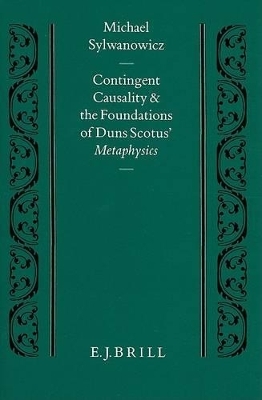
Contingent Causality and the Foundations of Duns Scotus' Metaphysics
Brill (Verlag)
978-90-04-10535-5 (ISBN)
This study challenges the current view that the originality of Duns Scotus' notion of contingent causality lies in modal logic. It works as an ontological concept, and so provides a point of entry into the foundations of Duns Scotus' metaphysics.
As one of two basic manifestations of the active causal power of being, it points to Scotus' underlying ontology, which can no longer be seen as a failure to attain Aquinas' clarity. We have a positive alternative, capable of generating the characteristic Scotist theses: univocity of being, formal distinction, haecceitas, proof of God's existence from possibility, the producibility of God's ideas.
The exploration of the role contingent causality plays in Scotus' and Bradwardine's views on free will and predestination, and Bradwardine's claim that 'God can undo the past', opens the way towards new interpretations.
Michael Sylwanowicz, Ph.D. (1990), Warburg Institute, University of London, is a Lecturer in Philosophy at the Franciscan Study Centre, Canterbury (1991-1995). At present he is writing a volume on aspects of ontological possibility in Henry of Ghent.
Acknowledgements
Introduction
Part 1: Towards a Definition of Contingent Causality
1. A "modal" concept?
2. The idea of the will: some backgrounds
3. Immediate conditions for the rise of the idea of contingent causality: towards a definition
Part 2: Contingent Causality and Fundamental Presuppositions: The Bases of Scotus' Metaphysics
4. Choice at an instant and contingent causality
5. The constitution of essence and perfection
6. Perfection as the presence of intrinsic activity and the basis of its irreducibility
Part 3: Applications of Contingent Causality
7. The human and divine will: freedom, contingent causality and determinism
8. Can God undo th epast? An application of contingent causality
Conclusion
References
Index
| Erscheint lt. Verlag | 1.10.1996 |
|---|---|
| Reihe/Serie | Studien und Texte zur Geistesgeschichte des Mittelalters ; 51 |
| Verlagsort | Leiden |
| Sprache | englisch |
| Gewicht | 635 g |
| Einbandart | Leinen |
| Themenwelt | Geisteswissenschaften ► Philosophie ► Metaphysik / Ontologie |
| Geisteswissenschaften ► Philosophie ► Philosophie des Mittelalters | |
| Geisteswissenschaften ► Religion / Theologie | |
| ISBN-10 | 90-04-10535-2 / 9004105352 |
| ISBN-13 | 978-90-04-10535-5 / 9789004105355 |
| Zustand | Neuware |
| Haben Sie eine Frage zum Produkt? |
aus dem Bereich


